
The Rice University Board of Trustees and Rice President Reginald DesRoches announced the release of the final report from the university’s Task Force on Slavery, Segregation and Racial Injustice in a message to the university community Oct. 6.

The Rice University Board of Trustees and Rice President Reginald DesRoches announced the release of the final report from the university’s Task Force on Slavery, Segregation and Racial Injustice in a message to the university community Oct. 6.
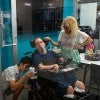
Robotic cup helps wheelchair users stay hydrated
Rice undergraduate engineering students Thomas Kutcher and Rafe Neathery designed a robotic device that enables people with limited mobility to stay hydrated without caretaker help.
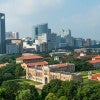
Rice’s Medical Humanities Research Institute has transformational agenda for health care
Rice University has launched its Medical Humanities Research Institute, the only institute in the United States and one of few in the world solely dedicated to advancing translational research on human experiences of health and illness.

Energy and foreign policy experts will examine the lessons learned from the 1973 oil embargo and their renewed relevance for today’s energy crises — triggered by Russia’s invasion of Ukraine and the risks presented by climate change — for countries, policymakers, companies and the public on Oct. 17 at Rice University’s Baker Institute for Public Policy.

Interdisciplinary Rice team tackles the future of semiconductors
An interdisciplinary team of Rice University scientists has won a $1.9 million National Science Foundation grant for research on materials that could serve as the basis for next-generation energy-efficient computing devices.
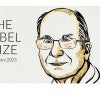
Rice alum Louis Brus awarded Nobel Prize in chemistry
Rice alumnus Louis Brus (’65) has been awarded the Nobel Prize in Chemistry alongside Moungi Bawendi and Alexei Ekimov for the “discovery and development of quantum dots.”

Rice Biotech Launch Pad introduces external advisory board
Rice University today announced its external advisory board for the Rice Biotech Launch Pad, the new accelerator focused on expediting the translation of the university’s health and medical technology discoveries into cures.
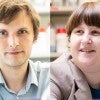
Two Rice bioengineers win NIH Director’s New Innovator awards
Rice bioengineers Jerzy Szablowski and Julea Vlassakis received the NIH Director’s New Innovator Award for their respective research projects. Szablowski’s work seeks to develop a noninvasive method of mapping gene expression, while Vlassakis is studying complex, single-cell level processes and interactions in pediatric bone cancer.

Houston residents willing to pay more for city parks, Rice Kinder Institute survey shows
Despite having one of the largest urban park systems in the country and one of the highest levels of philanthropic support of parks, Houston falls behind other major cities in funding them — and a majority of residents say they are willing to spend more to elevate the city’s investment, a new study by the Kinder Institute for Urban Research at Rice University has found.

Rice sociologist elected president of Religious Research Association
Elaine Howard Ecklund, the Herbert S. Autrey Chair in Social Sciences and director of Rice University’s Boniuk Institute for the Study and Advancement of Religious Tolerance, has been elected president of the Religious Research Association (RRA) for 2023-24.
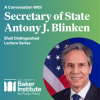
Secretary of State Blinken to join foreign policy discussion at Rice’s Baker Institute Oct. 3
U.S. Secretary of State Antony Blinken will join Rice University Baker Institute for Public Policy Director David Satterfield and Honorary Chair James A. Baker III to discuss the country’s foreign policy strategy at an event at Rice Oct. 3.

NSF backs Rice processor design, chip security research
Rice computer scientists have won two grants from the National Science Foundation to explore new information processing technologies and applications that combine co-designed hardware and software to allow for more effective and efficient data stream analysis using pattern matching.

Rice’s Baker Institute and Baker Botts to host global energy summit Oct. 4-5
The Baker Institute Center for Energy Studies at Rice University and Baker Botts L.L.P. will co-host their seventh annual energy summit Oct. 4-5. The two-day conference at Rice’s James A. Baker III Hall will feature international and domestic perspectives through keynote addresses and discussions with energy experts in industry, government and academia.
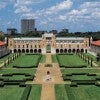
Rice joins nationwide effort to make financial aid more transparent
Rice University is one of more than 360 colleges in the U.S. committed to making financial aid offers more transparent.

It's easier to get valuable metals from battery waste if you ‘flash’ it
A battery recycling process developed by Rice scientists can retrieve valuable metals from mixed cathode and anode waste with a yield exceeding 98% in less time than normal using low-concentration acid, reducing both the cost and negative environmental impact.